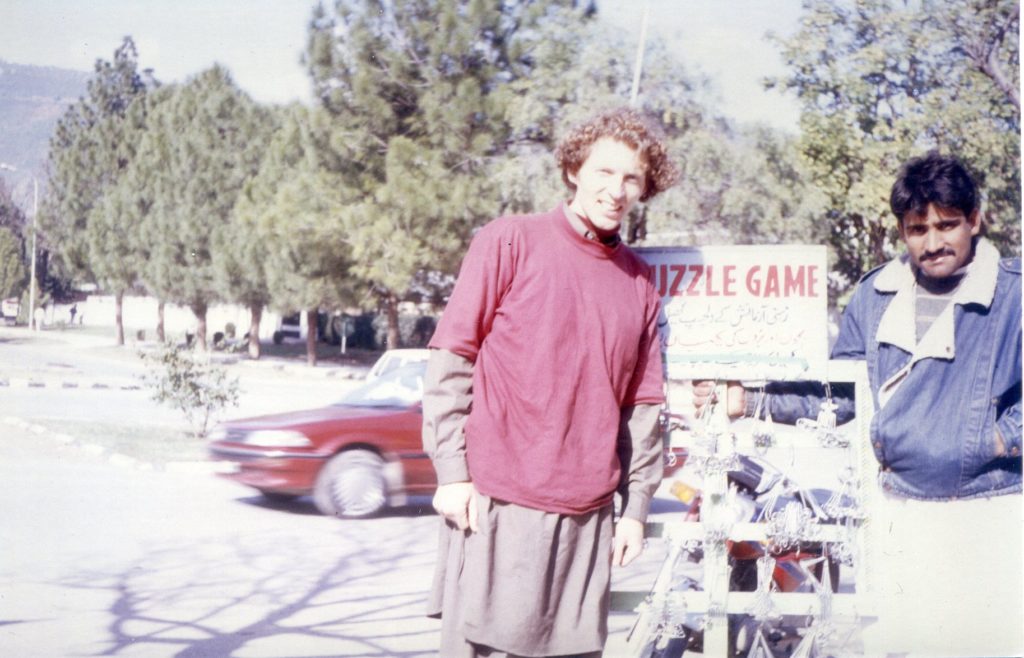Working towards deadlines versus working towards your goals.
OR
Why you should not stop everything else to study for exams?
A typical University student is in many ways like a firefighter, frequently dropping everything else to kill a fire; only that the ‘fire’ in the case of the student are exams, assignments and other pressing deadlines. Today I want to talk about why this ‘fire-controlling’ approach is a problem and about how you can overcome it.
My second last year in medical school. One of my best. I did interesting things all year long (which unfortunately did not include studying).
Me while in medical school (on holiday in Pakistan)
Then at the end of the year came the real bummer. We had about 10 exams in 10 weeks, all of them oral exams. During this period, which I remember as one of the most dreadful periods in my life (yes, worse than army), I spend all my time at home studying and catching up on my lack of knowledge. Or at least I was trying to. I remember one time when I went to my parents’ place and told them “I really can’t study anymore. I am ready to quit.” (They somehow managed to convince me to keep going. Parents are very good at this.)
Why is the fire-fighting approach to exam or other deadlines a problem?
First of all, it is not fun! Studying all day with a deadline is usually also not very productive as you get unmotivated and less receptive to take in information with time. You have to force yourself to continue and miss out on all your other activities that normally motivate you.
How much can you achieve when just studying one or two weeks before the exams? Not only will it limit your exam results, you are also likely to quickly forget what you crammed into your brain during the short study period. And that is really not helpful for your future modules.
Most importantly perhaps, by going through these marathon study sessions, you really limit yourself in what you can achieve in other areas (and in the long term, other activities that you are doing are probably more important.) The most important thing in any project, hobby or skill that you want to achieve is consistency. By dropping everything else before any exam, test or deadline you are not only NOT getting other things done, you also lose the momentum and you forget what the other projects are about.
So, what I would suggest to you is that next semester you try to adopt a schedule where during the exam period you can just carry on with your life as per normal. Here are some tips how you could possibly achieve this.
First, exams aren’t really THAT important and definitely not worth giving up everything else that means something to you. Although this is not really the main point here, it is worth remembering.
The obvious advice that most people would give is to study continuously, previewing and reviewing all lecture contents. But while I also had the intentions to do this as a student, it never worked out as there were always more important things to do! The problem is that we often try to rely on our motivation and willpower. But motivation and willpower come and go. And hence things only get done when the extrinsic “motivators”, i.e. deadlines, kick in. But that is too late, and you fall into the trap of chasing deadline after deadline, as discussed above…
The way to go about this is to build a habit to work on your important goals every day. For instance, my habit is to work on 4 different tasks or goals every day (please see below my daily habits). These include (1) to do something to improve my research, (2) to do something to succeed in my teaching, (3) to do something for my personal development and (4) to produce some output, like working on a paper or a blog post etc. And to make progress in these areas, I make sure I design my daily routine so that there is time for these activities. This is because I am doing these things in addition to the other things that I normally have to do as part of my job as a University Professor (admin work, meetings, help the students in the lab, check new literature, and more admin work). Importantly, I make sure I do something for each of the goals every day, even if it is only for short time, as things might be busy due to other responsibiities that I have at certain times. The small daily contributions will add up and eventually lead to mastery (I hope!). Working consistently on projects also helps to keep the momentum going and to stay focussed on the topic. Importantly, I also monitor progress, which is essential to keep the habit going and to stay motivated (see below).
So for instance, as a student, your daily tasks could look something like this:
Task 1: Work on two modules. This might include anything related to the modules except attending lectures (because this is your “day job”) and doing formal assignments (under Goal 2). Pursuing this goal consistently will help you do well in your coursework, but also ensure that you actually learn from your modules.
Task 2: Work on one assignment. If you don’t have one, you can find one, like writing your own blog, or asking one of your Profs whether you can write a small review article on some topic, which might even eventually be published. This goal will help you to actually produce some output, whether it is in the form of an excellent assignment or other things that are documented proof that you can deliver a meanigful product.
Task 3: Work on your research project. This may include doing some experiment, but could also be writing your lab book, analyzing data, preparing a presentation, lab meeting or report, or reading a paper. Of course, you may not have a formal research project. But I think it would still be good to work on something that you are passionate about, like developing an app or a software, or doing a bioinformatics project. Here are some interesting examples:
This goal will help you to gain independence and analytical and creative thinking skills, among various other skills.
Task 4: Work on your career preparation – this could be anything, like sourcing an internship, networking in person or online; reading blogs about career preparation to get ideas; work on your CV, your website etc.
While tasks 1 and 4 are a MUST for a student, tasks 2 and 3 could be replaced by other priorities you might have. For instance you might want to learn coding or a new language. It would be important to link anything you do to some specific goal(s). This is because it is easier to do something with a goal in mind and it is also much more impressive if your CV lists I learned coding and using this skill, I completed this project. Or I studied Japanese for 2 years, which enabled me to make personal contacts with over 20 locals, 5 of whom I am still in regular contact with.
Now you might say how am I supposed to fit all of these things into one day, when I still have to attend lectures, lab, research project or CCA (Co-Curricular Activities), and maybe have to eat with my family or have other things I am expected to do.
As this post is getting kind of long, we will discuss this in the blog!
Me while in Medical School, actually studying

